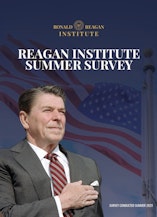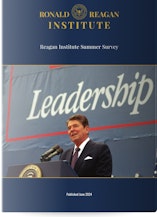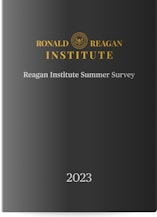Freedom & Democracy
Reagan Institute Summer Survey
Overview
The Reagan Institute Summer Survey is a public opinion poll that assists elected officials, policymakers, and key stakeholders with understanding how Americans view an array of foreign policy and national security matters
Explore The Surveys

2025 Reagan Institute Summer Survey
Americans Reject Isolationism, Embrace American Leadership and Economic Engagement

2024 Reagan Institute Summer Survey
From the conflict in the Middle East to Russia’s unprovoked war in Ukraine to increasing aggression from the Chinese Communist Party, Americans are yearning for a revival of Reaganesque principles.

2023 Reagan Institute Summer Survey
American public opinion on foreign policy and national security reflects an increasingly complex and, often, confusing world.
About The Reagan Institute Summer Survey
The Reagan Institute Summer Survey is an annual public opinion poll conducted by the Ronald Reagan Presidential Foundation and Institute to gauge the perspectives of Americans on key issues related to democracy, national security, and leadership. Launched as part of the Foundation’s efforts to promote informed citizenship and honor President Reagan’s enduring principles, the Summer Survey provides a comprehensive look at how Americans view pressing domestic and global challenges. By exploring attitudes on topics such as democratic values, foreign policy priorities, and the state of civic engagement, the survey serves as an invaluable resource for understanding the public’s outlook on the nation’s most critical issues.
The survey’s importance lies in its ability to capture the shifting dynamics of public opinion in a rapidly changing world. By providing a snapshot of the nation’s mindset, the Reagan Institute Summer Survey informs policymakers, thought leaders, and scholars, facilitating productive dialogue and informed decision-making. In the spirit of President Reagan’s vision for a strong and free America, the survey also emphasizes the role of informed public discourse in shaping a vibrant and resilient democracy. Through this initiative, the Foundation reinforces its mission to advance President Reagan’s legacy and promote the enduring values that define the American spirit.